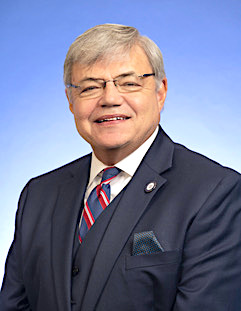Tenn. House of Representatives Weekly Wrap
Published 3:10 pm Monday, April 21, 2025

- State Rep. Dennis Powers
|
Getting your Trinity Audio player ready...
|
By State Rep. Dennis Powers
General Assembly passes $59.8 billion budget
The House and Senate chambers on Wednesday marked the fulfillment of their constitutional duty by passing a balanced $59.8 billion budget for the 2025-26 fiscal year. This year’s spending plan, which recognizes a 2% growth rate, reaffirms the General Assembly’s commitment to conservative budgeting while prioritizing the needs of Tennesseans across the state. The balanced budget advances the state’s efforts to improve public safety, invest in infrastructure, advance education, support rural health care, and increase disaster relief funding for Hurricane Helene recovery.
Trending
“Our focus is on lasting financial strength and stability for the Volunteer State,” said House Finance, Ways and Means Chair Gary Hicks, R-Rogersville. “This budget reaffirms our commitment to Tennesseans to keep our state on a conservative path to greater prosperity. We have tightened our belts, kept government spending low, and addressed a diverse range of needs, benefiting all Tennesseans.”
The legislative amendment makes fiscally responsible adjustments to the administration’s initial budget proposal by shifting $20 million in recurring allocations to nonrecurring, allowing the state to manage long-term spending obligations better.
“This budget reflects Tennessee’s strong commitment to responsible leadership and for addressing core priorities like education, public safety, and transportation while maintaining our conservative fiscal principles,” said House Private Acts Committee Chair Dennis Powers, R-Jacksboro.
Additionally, the General Assembly repurposed funds for legislative initiatives to support critical community needs, while maintaining Gov. Bill Lee’s major priorities.
Grant pool for critical community services: In the 2025-26 budget, the General Assembly created a $42.5 million grant pool, with nonrecurring funds, for important emergency and community services. The grants include:
- $20 million for volunteer fire departments
- $5 million for rescue squads
- $5 million for emergency medical services
- $5 million for senior centers
- $5 million for local museums for capital improvements
- $2 million for courthouse restoration
- $500,000 for Second Harvest Food Bank
Disaster relief for Hurricane Helene
Trending
The General Assembly continued to support victims of Hurricane Helene by providing $26 million nonrecurring for disaster relief for Helene victims in Northeast Tennessee and $20 million nonrecurring for local match funds for FEMA disaster relief.
Rural hospital support and health care investments
Lawmakers made significant investments in hospitals by using TennCare Shared Savings to provide an additional $78 million to help hospitals, particularly in rural areas, with uncompensated care and $4 million to complete capital projects at county health departments.
Additional health care investments include:
- $4 million recurring to increase pediatric dental rates
- $3 million nonrecurring to the Adult Healthcare Safety Net
- $500,000 nonrecurring to assist those living with epilepsy and their caregivers statewide
- $1.4 million recurring to provide scholarships for the joint public-private partnership in the Medical School Early Acceptance Program between MTSU and Meharry Medical College
- $1 million nonrecurring to Live Like Lou Foundation for ALS research
- $1 million nonrecurring for Volunteers in Medicine
The legislative amendment provides additional allocations in safety and security:
• $5.4 million nonrecurring to improve campus safety and security at the University of Memphis
- $500,000 nonrecurring to establish and operate the UT Law Enforcement Innovation Center
- $400,000 nonrecurring to support the East Tennessee Regional Forensic Facility and Training Program
Major investments secured
In addition to the adjustments made to fund legislative priorities, the budget maintains important investments proposed by Gov. Bill Lee, including:
- $1 billion into the road fund to address the state’s transportation infrastructure needs
- $62.7 million for K-12 infrastructure and facilities funding
- $244 million to strengthen education through the Tennessee Investment in Student Achievement (TISA) formula growth, including teacher pay raises
- $198.4 million for teacher bonuses
- $35.6 million investment into the Rainy-Day Fund, bringing the state’s reserves to nearly $2.2 billion, the largest in Tennessee history
- $25 million for grants to recruit new business to Tennessee and support workforce development
Expanding choices for parents
The General Assembly in January passed historic legislation empowering parents with the freedom to choose the right school for their child and have a say in where their tax dollars are spent, regardless of income or zip code. This school choice initiative invests $145.9 million in Education Freedom Scholarships.
- $77.2 million for K-12 infrastructure directed from existing sports wagering revenue
Tennessee is among the lowest-taxed states in the nation and collects zero income tax. Tennessee holds the highest bond rating issued by all three of the nation’s credit rating agencies, which reflects extreme confidence in the Volunteer State’s preparedness in meeting financial commitments in tough economic times.
State Rep. Dennis Powers represents the 36th House District, which includes Campbell, Union and parts of Claiborne County. He is the Full Chairman of the Public Acts Committee in the Tennessee House of Representatives. He also serves on the Business and Utilities Subcommittee, the State and Local Government Committee, Commerce Committee, Department and Agencies Sub-committee and Calendar and Rules Committee.





